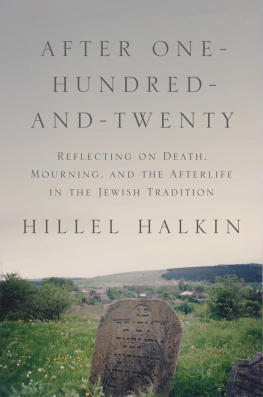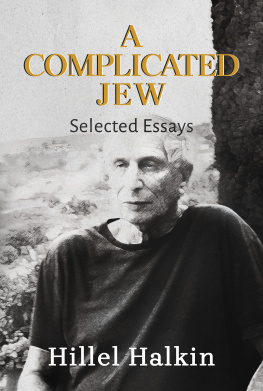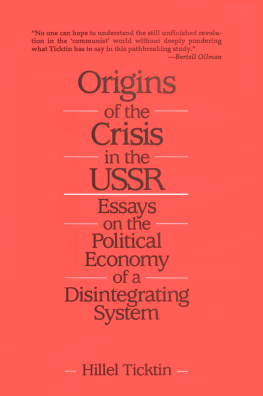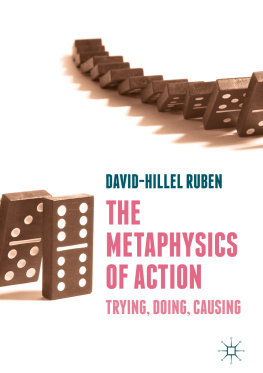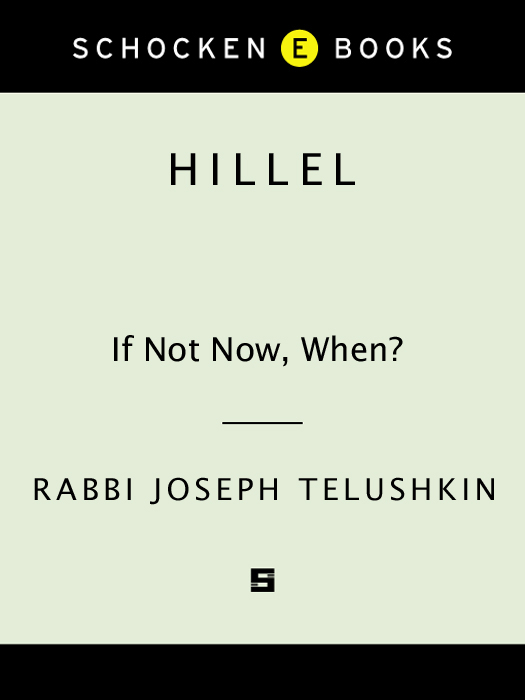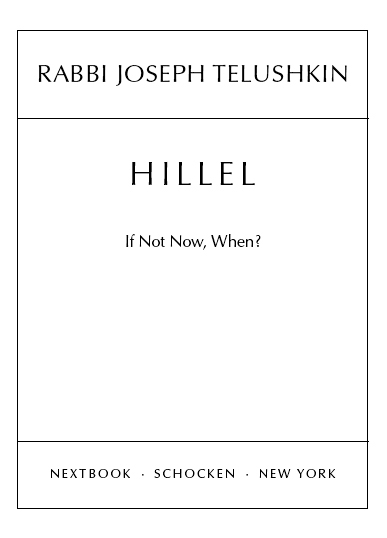JEWISH ENCOUNTERS
Jonathan Rosen, General Editor
Jewish Encounters is a collaboration between Schocken and Nextbook, a project devoted to the promotion of Jewish literature, culture, and ideas.
>nextbook
PUBLISHED
THE LIFE OF DAVID Robert Pinsky
MAIMONIDES Sherwin B. Nuland
BARNEY ROSS Douglas Century
BETRAYING SPINOZA Rebecca Goldstein
EMMA LAZARUS Esther Schor
THE WICKED SON David Mamet
MARC CHAGALL Jonathan Wilson
JEWS AND POWER Ruth R. Wisse
BENJAMIN DISRAELI Adam Kirsch
RESURRECTING HEBREW Ilan Stavans
THE JEWISH BODY Melvin Konner
RASHI Elie Wiesel
A FINE ROMANCE David Lehman
YEHUDA HALEVI Hillel Halkin
HILLEL Rabbi Joseph Telushkin
FORTHCOMING
THE WORLDS OF SHOLOM ALEICHEM Jeremy Dauber
ABRAHAM Alan M. Dershowitz
MOSES Stephen J. Dubner
BIROBIJAN Masha Gessen
JUDAH MACCABEE Jeffrey Goldberg
SACRED TRASH Adina Hoffman and Peter Cole
BURNT BOOKS Rodger Kamenetz
THE DAIRY RESTAURANT Ben Katchor
JOB Rabbi Harold S. Kushner
THE SONG OF SONGS Elena Lappin
ABRAHAM CAHAN Seth Lipsky
THE EICHMANN TRIAL Deborah E. Lipstadt
SHOW OF SHOWS David Margolick
JEWS AND MONEY Daphne Merkin
DAVID BEN-GURION Shimon Peres and David Landau
WHEN GRANT EXPELLED THE JEWS Jonathan Sarna
MESSIANISM Leon Wieseltier
Copyright 2010 by Rabbi Joseph Telushkin
All rights reserved. Published in the United States by Schocken Books, a division of Random House, Inc., New York, and in Canada by Random House of Canada Limited, Toronto.
Schocken Books and colophon are registered trademarks of Random House, Inc.
Library of Congress Cataloging-in-Publication Data
Telushkin, Joseph, [date]
Hillel : if not now, when? / Joseph Telushkin.
p. cm.
Includes bibliographical references and index.
eISBN: 978-0-8052-4289-8
1. Hillel, 1st cent. B.C./1st cent. A.D.Teachings.
2. Jewish ethics. 3. Beth Hillel and Beth Shammai.
I. Title.
BM 502.3. H 55 T 45 2010
296.120092dc22 2010008277
www.schocken.com
v3.1
If not now, when?
HILLEL , Ethics of the Fathers 1:14
For Jonathan Rosen
EDITOR EXTRAORDINAIRE
AND
For Carolyn Starman Hessel
FRIEND EXTRAORDINAIRE
CONTENTS
Part I
While Standing on One Foot:
The Unique Teachings of Hillel
Part II
Hillel versus Shammai:
The Talmuds Most Famous Adversaries
Part III
Hillel and Jesus
Part IV
Lessons from the First Century for the Twenty-first Centuryand Beyond
Appendix 1. He Who Does Not Increase, Will Decrease:
Additional Teachings of Hillel
INTRODUCTION
I was sitting with a rabbinic friend swapping stories about our lives and our work. He started talking about an encounter he recently had: A Jewish man, probably in his early thirties, and his non-Jewish girlfriend came to speak with me. They want to marry, but his parents are dead set against their only son marrying a Gentile. I asked the woman what she thought about the parents attitude, and she was honest. She said it seemed primitive and ridiculous. But she also said that, if necessary, shed be willing to convert. After all, she wants to be a good person, and Judaism, she assumes, wants people to be good and might well have something to teach her about goodness. Thats how she put it, might well have something to teach her about goodness.
And what did you tell her? I asked.
My friend, a rather traditional rabbi, answered: I told her that were in no rush to bring people in, that conversion to Judaism is a not a quick business: Presto, youre a Jew. Theres a lot to study, a lot of rituals to learn, and I certainly cant convert you before you do all that studying and commit yourself to practicing all that you study.
And what did she say to that?
It was the boyfriend who spoke up. He seemed really annoyed. I told you this was pointless, he said to the girl, and then he turned to me. Were getting married in six weeks, Rabbi. With or without your help.
My friend shrugged. I told them that even if the two of them had come in with a more open attitude, six weeks was way too quick to do a conversion. Six months would be a stretch. They walked out with a book I gave them, but theyre not coming back, I can tell. My friend shook his head a few times, his expression a mixture of sadness and annoyance. What I was really thinking was that theyd be better off going to city hall and just getting their license. We dont need converts like that. One day, if shes interested in becoming a real Jew, she can come see me. He shrugged and regarded my skeptical face. I know, I know, that days never going to come.
I was quiet a minute, thinking about, of all things, a Talmudic sage who lived two thousand years ago named Hillel, and about an American-Jewish community thats been getting smaller and smaller, and whose members have been intermarrying at a rate of 40 percent and higher for more than thirty years.
What about that comment she made to you? I finally asked him.
He looked puzzled. Which comment?
That Judaism might well have something to teach her about being a good person.
Nice words, he conceded. But I would have been a little more encouraged if she had actually said something about religion. Like maybe she had read about Shabbat and wanted to observe it. Or she was willing to keep kosher. At least then I would have felt that I had something to work with. But this couple gave me nothing to work with.
Nothing to work with. His words reverberated in my head.
At the time, I had already begun thinking that I would like to write a book about Hillel, and this encounter only heightened my resolve. Hillel, I am convinced, would have found absolutely wrongheaded my friends all-too-common and reflexively discouraging approach to conversion. In the same way, I find it hard to imagine Hillel approving of the strange limbo in which some three hundred thousand Russians of questionable Jewishand sometimes non-Jewishparentage are presently living in Israel, many of whom want to become Jews. I thought of Hillel because he is not only, arguably, Judaisms greatest rabbinic sage, but also its most fearlessly inclusive.
He is also the rabbinic figure most willing to give ethical behavior equalor even greaterweight, along with strict adherence to the ritual laws. The story for which Hillel is best known, a story we will look at in greater detail in this book, involves a non-Jew who is open to converting to Judaism but who wishes to learn about Judaism not in six weeks, but while standing on one footthat is, in a single sound bite. Having literally been driven away with a stick by another rabbi who is affronted by his request, the non-Jew comes to Hillel, who is open to converting him. Hillel offers the man a single precept that surprisingly mentions neither God nor the rituals of the Torah, only the decent treatment of ones fellow man, along with the admonition to keep studying. If there is an essence of Hillel, it is in this story, in which he himself dares to offer an essence of Judaism.
Writing a conventional biography of Hillel is, alas, impossible. All that we know of Hillels life comes from a variety of stories in the Talmud (and in related works, such as the Midrash). The Talmud is, along with the Bible, Judaisms most important literary creation, a compendium of legal discussions, but its roots reach down to the oldest stratum of Judaism and, in the belief of the Talmuds sages, many of its teachings go back to Mount Sinai itself. But though a formal biography is impossible, for reasons that will soon become apparent, I believe it is still possible to construct a very clear impression of a man whose message speaks more urgently to Jews and Judaism today than that of any other Jewish figure in the last two thousand years.


